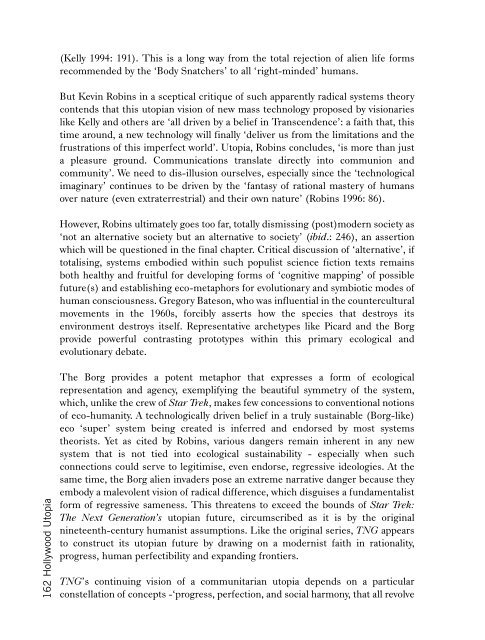Hollywood Utopia
Hollywood Utopia
Hollywood Utopia
You also want an ePaper? Increase the reach of your titles
YUMPU automatically turns print PDFs into web optimized ePapers that Google loves.
162 <strong>Hollywood</strong> <strong>Utopia</strong><br />
(Kelly 1994: 191). This is a long way from the total rejection of alien life forms<br />
recommended by the ‘Body Snatchers’ to all ‘right-minded’ humans.<br />
But Kevin Robins in a sceptical critique of such apparently radical systems theory<br />
contends that this utopian vision of new mass technology proposed by visionaries<br />
like Kelly and others are ‘all driven by a belief in Transcendence’: a faith that, this<br />
time around, a new technology will finally ‘deliver us from the limitations and the<br />
frustrations of this imperfect world’. <strong>Utopia</strong>, Robins concludes, ‘is more than just<br />
a pleasure ground. Communications translate directly into communion and<br />
community’. We need to dis-illusion ourselves, especially since the ‘technological<br />
imaginary’ continues to be driven by the ‘fantasy of rational mastery of humans<br />
over nature (even extraterrestrial) and their own nature’ (Robins 1996: 86).<br />
However, Robins ultimately goes too far, totally dismissing (post)modern society as<br />
‘not an alternative society but an alternative to society’ (ibid.: 246), an assertion<br />
which will be questioned in the final chapter. Critical discussion of ‘alternative’, if<br />
totalising, systems embodied within such populist science fiction texts remains<br />
both healthy and fruitful for developing forms of ‘cognitive mapping’ of possible<br />
future(s) and establishing eco-metaphors for evolutionary and symbiotic modes of<br />
human consciousness. Gregory Bateson, who was influential in the countercultural<br />
movements in the 1960s, forcibly asserts how the species that destroys its<br />
environment destroys itself. Representative archetypes like Picard and the Borg<br />
provide powerful contrasting prototypes within this primary ecological and<br />
evolutionary debate.<br />
The Borg provides a potent metaphor that expresses a form of ecological<br />
representation and agency, exemplifying the beautiful symmetry of the system,<br />
which, unlike the crew of Star Trek, makes few concessions to conventional notions<br />
of eco-humanity. A technologically driven belief in a truly sustainable (Borg-like)<br />
eco ‘super’ system being created is inferred and endorsed by most systems<br />
theorists. Yet as cited by Robins, various dangers remain inherent in any new<br />
system that is not tied into ecological sustainability - especially when such<br />
connections could serve to legitimise, even endorse, regressive ideologies. At the<br />
same time, the Borg alien invaders pose an extreme narrative danger because they<br />
embody a malevolent vision of radical difference, which disguises a fundamentalist<br />
form of regressive sameness. This threatens to exceed the bounds of Star Trek:<br />
The Next Generation’s utopian future, circumscribed as it is by the original<br />
nineteenth-century humanist assumptions. Like the original series, TNG appears<br />
to construct its utopian future by drawing on a modernist faith in rationality,<br />
progress, human perfectibility and expanding frontiers.<br />
TNG’s continuing vision of a communitarian utopia depends on a particular<br />
constellation of concepts -‘progress, perfection, and social harmony, that all revolve
















